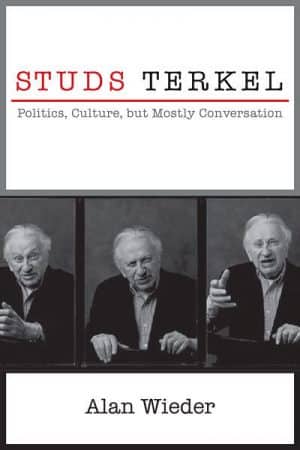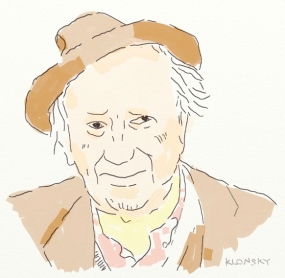Studs Terkel interviewed people on his WFMT radio show for
forty-five years. Occasionally, though, the tables were turned and guests
interviewed Studs. This happened on January, 16, 1967 when Studs’ friends,
journalists Mike Royko and Herman Kogan, quizzed Studs about his new book, Division Street America. The book was
the first of eighteen books that Studs wrote with the guidance of Andre
Schiffrin. All were published between Studs’ fifty-fifth birthday and his death
at ninety-six. Known as the world’s best listener, Studs was revered for both
his radio and book interviews. He nurtured people so that they talked with
great depth about their lives—personally, politically, and culturally. Royko
and Kogan cultivated the same from Studs.
The friendship of Studs Terkel
and Mike Royko is well documented. They had each others’ backs and were equally
critical of the first Mayor Daley. Royko visited The Studs Terkel Show many times and also understood the depth of
Studs’ work. “He
might not know what year someone was born,
maybe not what decade even—but he knows where their heart is, he knows where
their soul is, and where to find the things in them they care about.”
Herman Kogan’s friendship with Studs was also well known in Chicago and he too
understood Terkel: “Asking questions of
everyone and of himself. Evoking revealing answers,
rarely lingering over woes that may have befallen him but ardent in his
ire about injustices heaped
on others.”
These friendships were evident throughout the hour
interview. The men gently teased each other beginning with Royko questioning
Studs’ alibi for the previous night when McCormick Place, named for one of
Studs’ 1940’s enemies, right-wing Chicago
Tribune publisher Colonol Robert McCormick, burned to the ground. Royko was
thoughtful talking to Studs, but he was also irreverent telling the listeners
that there were “a lot of pages in the book for the money and it’s sturdy.”
Kogan kept guiding the discussion back to the book.
Studs began by telling the story of being approached by
Schiffrin to write a book on Chicago as a village to which he had asked the
publisher if he was crazy. Kogan cited Martin Marty’s review of the book which
says Division Street is a metaphor
for the human condition. Then he says to Studs: “Its very true. It’s not
Division Street literally—Division Street Chicago nor is it Division Street
America necessarily. It’s Division Street the World.”
But Studs lengthened the conversation comparing the city to
Rome and Johannesburg: “Chicago is a metaphor itself. Just as Division Street
is, so is Chicago. It’s probably the ideal city for it because it is in what
Chamber of Commerce says is in the heartland of our country. The industrial
city.”
Both men asked Studs questions and Royko nurtured Studs
talking about conversation when he asked him if he had trouble getting people
to talk. Studs was clear in his response:
No, I think if you’re not an
interviewer. This sounds like a cliché, if it’s conversation Mike, if they feel
you ask them a question and you’re really interested. I think you have to be
interested. I don’t know—I have no technique that I can explain. It’s just
talking. Everyone of them was good. I myself was astonished. I was so surprised
so often
Remember, Studs Terkel lived to be amazed. He talked about
Dennis Mitchell’s film, “Morning in the Streets,” airing the hurts of people,
those Studs often referred to as the “uncelebrated.” Then Kogan said, “You are
able to get people who are inarticulate to talk almost as if they are on a
psychoanalytical couch. They expressed to you things they’ve probably not
expressed to anyone. Maybe not even to themselves.”
In the years to come, Studs would speak to this topic
numerous times when asked about both his radio and book conversations. Although
he didn’t disagree with Herman Kogan on the air, Studs was later on record as
saying that the people who appeared in his books were actually very articulate.
They spoke for themselves individually but also for many others in their
communities and in the World. On the air with Kogan and Royko, he said:
This is exactly what some of them
said. They didn’t realize what they really were thinking. When it was all over
people saying, “Wow, is that the way I feel?” Astonishment I think describes my
own feelings after the interviews. There’s a key I think and it’s not the same
key but there’s a common attribute and that is to be recognized as somebody. And
the fears, each one has some fears, not the same fears, but fear in common.
Both Kogan and Royko ask Studs about people reflecting on “The
Bomb,” but Studs expands the issue and comes back to fears and people wanting
to be someone, to be recognized, for Studs, to be respected. “They’re all
crying out for something – everyone. No matter what their politics.” And then
both Royko and Studs remember that one of the people in the book had a slight
laugh when she explained that she never thought about “The Bomb.” Studs had
previous experiences with his friend Big Bill Broonzy and later Nobel Prize
winner and African National Congress leader Albert Luthuli softly laughing at
examples of white supremacy and apartheid. “The laugh comes at a certain
moment. Not at a joke, the laugh comes at a bitter moment, you see. So the
laugh itself is a protection from going altogether mad, you know. So the laugh
very often is the opposite of joy,” said Studs.
While Studs fought white supremacy his entire life, he also
yearned to understand white racism—people’s fear, people needing to be
somebody. On air he reflects on those people who threw rocks at Martin Luther
King telling Kogan and Royko:
The value of the things and the
valuelessness of the man by comparison. So the things become more important and
this in a way to me helps to explain Gage Park and Marquette Park too. These
are not basically evil people who threw the rocks at King. Who offered those
obscenities. They are people who have become terrified by something outside the
house, the colored TV set, the well-kept lawn. The status, that itself becomes
the important thing. And because his life is joyless—the kids I saw in
Montgomery, Alabama. I mean the white kids, the National Guardsman with the
confederate emblems. They were bewildered by that march because the myth is
shattered. The myth of someone less than they. So, for in order for the people
at Gage Park or Marquette Park or the kids on the sidewalks of Montgomery or
the furious car dealers in Montgomery or the guys that join the Klan—in order
for them to survive a life without joy, a life that is rather bleak and
retched, they must be told there is someone less than they. But if someone less
than they says I’m not less than you then the myth is shattered and they must
explode. So it’s the question of shattering of a myth.
Tribute to things rather than humanity. But because he’s
Studs Terkel, he has to speak of hope long before his book Hope Dies Last. Studs begins with a caveat saying that Mike might
disagree with his admiration of “the protesting kids.” He speaks about Jessie
Binford, the 90-year old social activist who closes out Division Street, and her belief in youth and his intrigue with middle
class kids voluntarily joining poor people who don’t volunteer to be poor.
Herman Kogan agrees as he steers Studs and Mike back to the book saying that
Studs is a man of joy and sorrow and the book is joy and sorrow.” To which
Studs cites Sean O’casey: “Life is a song in one ear and a lament in the other.”
As the show comes to an end Studs tells Kogan that there
isn’t really a favorite person in Division
Street. Kogan calls it “The People’s Book, but for Royko and Kogan, the
favorite person in the book is Studs Terkel.
Alan Wieder is the author of the recently released book,
Studs Terkel: Politics, Culture, but Mostly Conversation. Many of Studs’ WFMT
radio interviews can be accessed at studsterkel.org.









